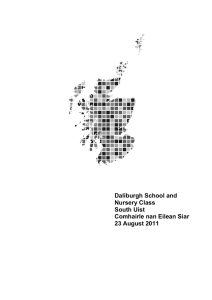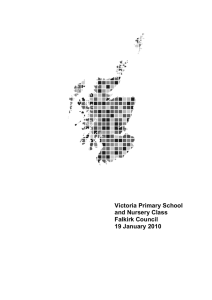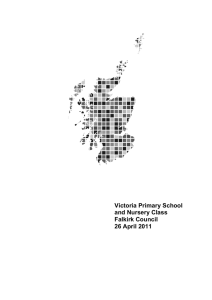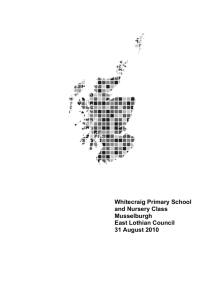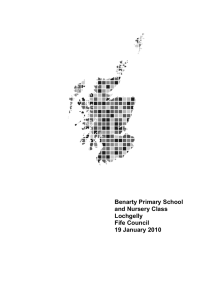Gairloch Primary School and Nursery Class The Highland Council
advertisement
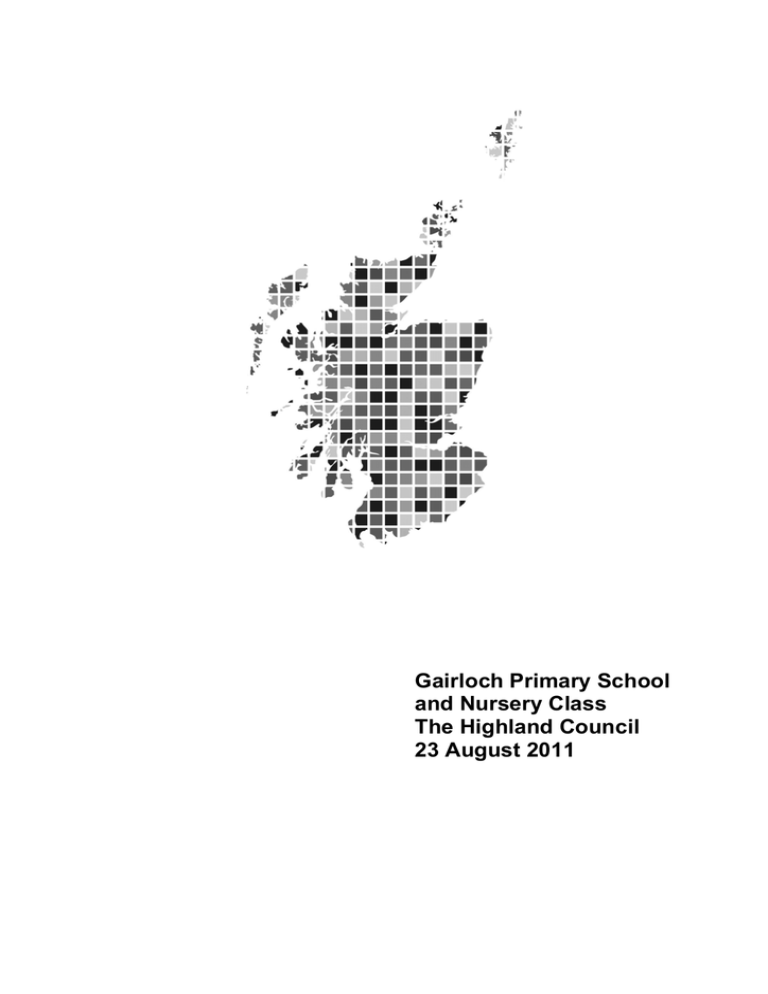
Gairloch Primary School and Nursery Class The Highland Council 23 August 2011 HM Inspectorate of Education (HMIE) inspects schools in order to let parents1, children and the local community know whether their school2 provides a good education. Inspectors also discuss with school staff how they can improve the quality of education. At the beginning of the inspection, we ask the headteacher and staff about the strengths of the school, what needs to improve, and how they know. We use the information they give us to help us plan what we are going to look at. During the inspection, we go into classes and join other activities in which children are involved. We also gather the views of children, parents, staff and members of the local community. We find their views very helpful and use them together with the other information we have collected to arrive at our view of the quality of education. This report tells you what we found during the inspection and the quality of education in the school. We describe how well children are doing, how good the school is at helping them to learn and how well it cares for them. We comment on how well staff, parents and children work together and how they go about improving the school. We also comment on how well the school works with other groups in the community, including services which support children. Finally, we focus on how well the school is led and how staff help the school achieve its aims. If you would like to learn more about our inspection of the school, please visit www.hmie.gov.uk. Here you can find analyses of questionnaire returns from children, parents and staff. We will not provide questionnaire analyses where the numbers of returns are so small that they could identify individuals. 1 Throughout this report, the term ‘parents’ should be taken to include foster carers, residential care staff and carers who are relatives or friends. 2 The term ‘school’ includes the nursery class or classes where appropriate. Contents 1. The school 2. Particular strengths of the school 3. How well do children learn and achieve? 4. How well do staff work with others to support children’s learning? 5. Are staff and children actively involved in improving their school community? 6. Does the school have high expectations of all children? 7. Does the school have a clear sense of direction? 8. What happens next? 1. The school Gairloch Primary School is a non-denominational school with a nursery class. It serves the village of Gairloch and the surrounding rural area. The roll was 99, including 17 in the Gaelic medium classes, ten in the English speaking nursery class and nine in the Gaelic nursery class when the inspection was carried out in May 2011. Children’s attendance was in line with the national average in 2009/2010. The headteacher also has management responsibility for Poolewe Primary School. 1 2. Particular strengths of the school • Children’s wider achievements and their attainment in mathematics. • Positive partnerships and community links which support children’s learning. • Staff commitment to improving the school, and to the care and welfare of all children. • The headteacher’s effective leadership of change. 3. How well do children learn and achieve? Learning and achievement Children in the nursery classes are happy and behave considerately to each other. Most are keen to learn. They move confidently between play areas, including outdoors, and concentrate well on what they have chosen to do. Children, particularly in the English speaking nursery, benefit from high quality dialogue with staff. Across the primary classes, many children are beginning to work on relevant and enjoyable activities. In some English speaking classes, this independent, active approach to learning is not yet consistent enough in all lessons. When working on cross-curricular topics, most children are beginning to discuss activities as a group and to develop independent learning skills. These skills are well developed in Gaelic classes. In the nursery classes, children are developing confidence in turn taking and sharing. They are developing their vocabulary and can express themselves clearly. Children in the Gaelic medium nursery are developing an understanding of Gaelic idiom. In both nursery 2 classes, children listen well to stories and to simple instructions. Their skills in early mathematics are developing well. Almost all can match and sort materials. In the primary classes, children show a clear understanding of environmental issues. The school has achieved a Green Flag award from Eco-Schools Scotland. A few children are developing skills as responsible citizens by taking on recognised roles in helping others. More could do so. Children take an active part in a range of musical, sporting and cultural activities. They work within the community to raise considerable funds for charity. Many achieve personal success at local events and festivals, including the Plockton Drama Festival. Several have broadcast with confidence on the local radio station. Many entertain local residents with regular shows and concerts. Children in the Gaelic classes achieved well at the local Mod and performed at a radio drama. Children in the nursery classes are making good progress in their learning. Children are confident in expressing their feelings and ideas and listen well to adults and one another. They are keen to look at books with adults or by themselves. Almost all can write their names. They are learning early mathematics skills well through their play. In Gaelic medium primary classes, children are making very good progress overall in listening and talking in Gaelic. Their skills in reading and writing are progressing well. A few could write at greater length. In English speaking classes, several children do not listen well enough. Their skills in group discussion need further development. At the early stages, children are eager to read and do so with increasing fluency and expression. By P7, higher achieving children can respond sensitively to challenging texts. Throughout the primary classes, children write for a wide range of purposes. In English speaking classes, children write interesting pieces in connection with their topic work, but, overall, standards of writing are not high enough. Staff are working hard to help children at all stages improve their spelling. Across the school, children are achieving very well in mathematics and are making good progress. By P7, almost all children are quick and accurate in their mental calculations. They are good at creating and interpreting a wide range of graphs and charts. Many can solve a range of problems with confidence. 3 Curriculum and meeting learning needs Teachers are improving children’s learning experiences taking account of Curriculum for Excellence. Children in the nursery classes are learning well through a broad range of activities. They can make choices in their play. In all primary classes, children are beginning to use their skills in literacy and numeracy to help them learn in other areas of the curriculum. Staff have begun to develop children’s knowledge and skills in all aspects of health and wellbeing. Staff provide good opportunities for children to learn outdoors, using the local environment effectively. All children learn to swim. Children at P6 and P7 develop their teamworking skills through a residential experience at Badaguish Outdoor Centre. A wide range of visits and visitors enriches learning at all stages. The school has provided a good range of sporting and musical activities at lunchtime clubs, but few children opt to attend regularly. All children benefit from two hours of high quality physical education each week. Across the nursery and primary classes, staff know and understand the needs of individual children well. They are very caring and supportive to children. Across the primary stages, teachers organise tasks and activities which suit the learning needs of most children. In a few classes, the level of work is not challenging enough for a few children. Children experiencing difficulties are well supported and included. A number of children have helpful individualised educational programmes containing appropriate learning and social targets. Support staff help children very well to learn, particularly in reading. As a result of the school’s approaches, children with additional support needs are making good progress. Teachers set a wide variety of interesting and challenging homework. 4. How well do staff work with others to support children’s learning? Staff work well with a range of professional partners in other services and agencies to support children’s learning. The Parent Council is 4 very supportive of the work of the school. A number of parents work alongside teachers in school or accompany children on outings. Others share their expertise and experiences with children to develop their learning. Parents find school reports helpful and informative. Strong partnerships with members of the community help enrich children’s learning. The school offers suitable arrangements to consult on sensitive aspects of the school’s programme of relationships and health education. The school responds promptly and appropriately to any complaints or concerns. Children are very well supported at times of transition. 5. Are staff and children actively involved in improving their school community? Across the school, staff have created a caring and supportive atmosphere where children, parents and visitors feel welcome and valued. Staff are eager to continue to improve the school. They work together in a strong team and are involved fully in the life of the school. Staff, children and parents are keen to play their part in school improvement. Children are capable of playing a greater role in helping evaluate and plan improvements that impact on learning and teaching. The headteacher uses a range of ways to gather information to improve the work of the school. She reviews teaching plans, carries out classroom visits and provides teachers with helpful feedback on learning and teaching. These approaches now need more rigour to ensure learning is of a consistently high quality across the school. 6. Does the school have high expectations of all children? Staff have very positive relationships with children. Children are friendly and polite to staff and visitors, but not always to each other. The school plans to review its approaches to promoting positive relationships to address consistently any minor restlessness among children in a few classes. Staff celebrate children’s many successes at assemblies, with well-judged praise and with class reward systems. 5 All school staff know what to do to keep children safe and well. The education authority should ensure that catering staff receive appropriate training in child protection. There are appropriate opportunities for religious observance. Children are developing a secure understanding of fitness and a healthy diet. There is scope for some children to develop their expectations of themselves as learners. 7. Does the school have a clear sense of direction? The headteacher has a strong commitment to the school and the community. She has a clear vision for the school which she has shared widely. She is supported well by the principal teacher who effectively leads developments in the school’s approaches to assessment. More rigour is now needed in monitoring the progress of learners to ensure appropriate levels of challenge for all children. Staff are involved in developing the school’s vision and values. They take responsibility for developing aspects of the work of the school. The school is ready to improve further and is well placed to continue its development of Curriculum for Excellence. 8. What happens next? We are confident that the school will be able to make the necessary improvements in light of the inspection findings. As a result, we will make no more visits in connection with this inspection. The school and the education authority will inform parents about the school's progress in improving the quality of education. 6 We have agreed the following areas for improvement with the school and education authority. • Work together better to develop good practice more consistently across all aspects of the school and nursery classes. • Continue to improve children’s learning experiences, taking account of Curriculum for Excellence. • Improve self-evaluation to ensure that the learning needs of all children are met. At the last Care Commission inspection of the nursery classes there were no requirements and no recommendations. 7 Quality indicators help schools and nursery classes, education authorities and inspectors to judge what is good and what needs to be improved in the work of a school and a nursery class. You can find these quality indicators in the HMIE publications How good is our school? and The Child at the Centre. Following the inspection of each school, the Scottish Government gathers evaluations of three important quality indicators to keep track of how well all Scottish schools and nursery classes are doing. Here are the evaluations for Gairloch Primary School and Nursery Class. Primary school Improvements in performance Learners’ experiences Meeting learning needs good good good Nursery class Improvements in performance Children’s experiences Meeting learning needs good good good We also evaluated the following aspects of the work of the school and nursery class. The curriculum Improvement through self-evaluation HM Inspector: Anne McGachey 23 August 2011 8 good good When we write reports, we use the following word scale so that our readers can see clearly what our judgments mean. excellent very good good means means means satisfactory weak unsatisfactory means means means outstanding, sector leading major strengths important strengths with some areas for improvement strengths just outweigh weaknesses important weaknesses major weaknesses If you would like to find out more about our inspections or get an electronic copy of this report, please go to www.hmie.gov.uk. Please contact us if you want to know how to get the report in a different format, for example, in a translation, or if you wish to comment about any aspect of our inspections. You can contact us at HMIEenquiries@hmie.gsi.gov.uk or write to us at BMCT, HM Inspectorate of Education, Denholm House, Almondvale Business Park, Almondvale Way, Livingston EH54 6GA. Text phone users can contact us on 01506 600 236. This is a service for deaf users. Please do not use this number for voice calls as the line will not connect you to a member of staff. You can find our complaints procedure on our website www.hmie.gov.uk or alternatively you can contact our Complaints Manager, at the address above or by telephoning 01506 600259. Crown Copyright 2011 HM Inspectorate of Education

